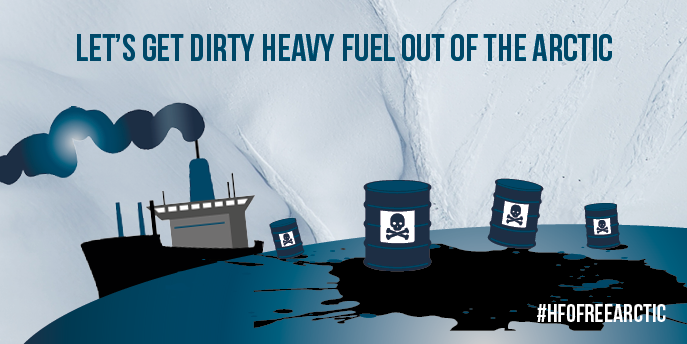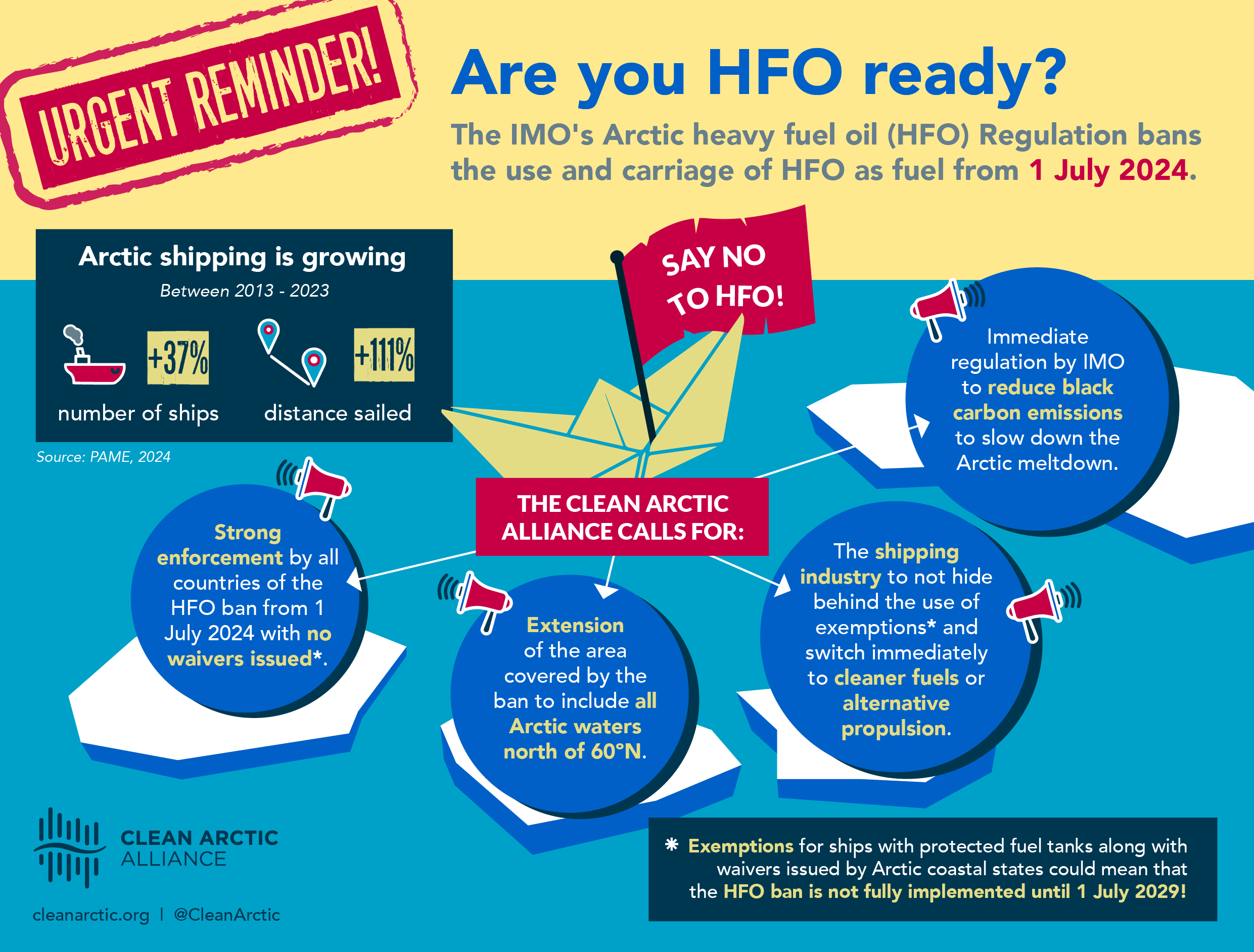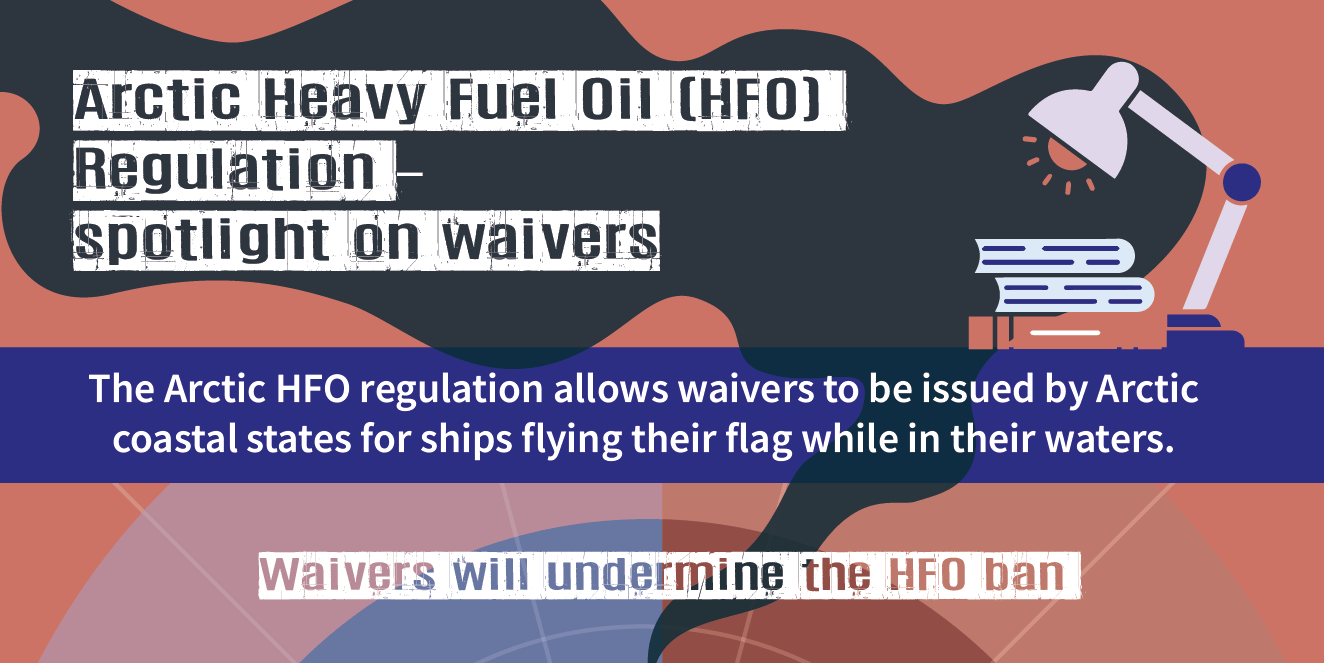London, October 24 2016:- As the International Maritime Organization’s Marine Environment Protection Committee meeting opened today in London [1], the Clean Arctic Alliance called on IMO members to end the use of heavy fuel oil (HFO) in Arctic waters.
HFO, a toxic, tar-like sludge that breaks down extremely slowly in cold Arctic waters and close to impossible to clean up in the event of a spill, is used by almost half the ships operating in the Arctic [2]. HFO poses a severe risk to the fragile marine Arctic environment and the coastal communities that depend upon the sea’s resources.
During the MEPC meeting, discussions relating to shipping fuels and emissions will likely predominate, as the body also considers deadlines for setting sulfur limits in fuels, and initiates debates on greenhouse gas emissions from ships.
“This week, the International Maritime Organization has the perfect platform to begin the immediate phase-out of the use of heavy fuel oils in Arctic waters”, said Dr Sian Prior, Advisor to the Clean Arctic Alliance, a coalition of international not-for-profit organisations. “With some parts of the shipping sector already taking action, now it’s time to build on that momentum”.
“When this meeting ends on Friday, member countries must have agreed to address the risks of using HFO in the Arctic”, continued Prior. “To move forward, the IMO must add new work on the regulation of HFO to its programme, and set a tight deadline for completion of that work, in order to achieve a phase out by 2020.
In early September, the United States and Canada formally notified the International Maritime Organization that a “heavy fuel oil spill in the Arctic could cause long-term damage to the environment” [3]. This follows March 2016 commitments made by U.S. President Obama and Canadian Prime Minister Trudeau to “determine with Arctic partners how best to address the risks posed by heavy fuel oil use and black carbon emissions from Arctic shipping” [4] . Also in September, the Danish political party Venstre and the Danish Shipowner’s Association [5], and an Arctic cruise sector leader Hurtigruten [6] called for regulating or banning the use of HFO in the Arctic.
Heavy fuel oil is already banned throughout Antarctica, and in the national park waters around the Norwegian Arctic archipelago of Svalbard, leaving only a strictly regulated corridor for ships to access the islands.
“Eliminating the use of HFO for fuel in Arctic waters is the most direct mechanism for mitigating the many consequences of an HFO spill, and reducing harmful C02 and black carbon emissions in the Arctic region,” continued Prior. “Phasing out HFO, and replacing it with cleaner, more efficient fuels – such as so-called transition fuels, like LNG or lighter distillate fuels, would be a step in the right direction towards fossil-fuel free shipping”.
The burning of heavy fuel oil by ships emits significant quantities of black carbon, potent in accelerating the already rapid pace of Arctic climate change. In the Arctic atmosphere, black carbon absorbs heat from the sun and reflected heat from the snow and ice doubling the warming impact when it settles on the snow and ice surfaces. When black carbon falls on the light-coloured surfaces, it reduces the amount of sunlight reflected back into space, accelerating snow and ice melt. This increases the surface area of exposed, dark ocean water, and promotes a self-reinforcing cycle of land and sea ice melting and climate warming.
Dr Prior said: “It is imperative that discussion of an HFO ban is added to the IMO’s agenda, particularly since the short lifetime of black carbon from burning HFO in the Arctic means that controls can have an immediate impact, both for protection of the Arctic climate, for reducing the risks of economically, socially and environmentally devastating HFO spills”.
“Arctic waters include some of the world’s most productive ocean ecosystems, providing sustenance to large populations of whales, seals, and walruses and seabirds. Some of the world’s highest volume fisheries rely on the incredibly productive Arctic waters. Ending the use of HFO in Arctic waters is one way to protect these ecosystems”, concluded Dr Prior.
On Wednesday 26th October, a panel of Arctic indigenous speakers from Russia, the United States, and Canada will address the IMO, the United Nations’ agency which sets rules for international shipping. The speakers, including Eduard Zdor of the Association of Traditional Marine Mammal Hunters of Chukotka, Hans Lennie of the Inuvik Hunters and Trappers Committee and the Inuvialuit Game Council, and Tagak Curley, considered one of the Fathers of Nunavut for his role in negotiating and establishing the territory, will outline the benefits and threats posed by shipping to food security and way of life in the north during a 30-minute session on the need for ongoing indigenous engagement from the IMO. They are expected to discuss specific measures the MEPC can take, including banning HFO, in order to eliminate spill risk and emissions impacts, as well as taking stronger environmental provisions in the Polar Code. The IMO is currently not advised by an indigenous delegation when setting shipping policy [7].
ENDS
Notes:
[1] The 70th Session of the International Maritime Organization’s Marine Environment Protection Committee (MEPC70) will meet from October 24-28th in London.
http://www.imo.org/en/MediaCentre/IMOMediaAccreditation/Pages/MEPC-70.aspx
[2] In 2015 there were 925 vessels operating in the Arctic using HFO. This is 44.3% of the total number of vessels operating in Arctic waters, representing 76% of the mass of bunker fuel onboard ships in the IMO Arctic fleet. Source:
Heavy fuel oil use in Arctic shipping in 2015, International Council on Clean Transportation http://www.theicct.org/heavy-fuel-oil-use-arctic-shipping-2015
[3] US & Canada Joint Statement on Heavy Fuel Oil
http://awsassets.panda.org/downloads/us_can_hfo.pdf
[4] US & Canada Joint Statement on Climate, Energy and Arctic Leadership
[5] Danish shippers want IMO Heavy Fuel Ban in Arctic
https://www.adn.com/arctic/2016/09/20/danish-shippers-want-imo-heavy-fuel-ban-in-arctic/
[6] Hurtigruten CEO calls for size limit on Arctic cruise vessels
http://thebarentsobserver.com/2016/08/hurtigruten-ceo-encourages-limit-size-arctic-cruise-vessels
[7] Pacific Environment: Arctic indigenous leaders from Alaska, Russia, and Canada to make historic London address on impacts of Arctic Ocean shipping
About the Clean Arctic Alliance
The following not-for-profit organisations form the Clean Arctic Alliance, which is committed to achieving the phase out of HFO as marine fuel in the Arctic:
Bellona, Clean Air Task Force, Danish Ecological Council, Environmental Investigation Agency, European Climate Foundation, Friends of the Earth US, Icelandic Nature Conservation Association, Nature And Biodiversity Conservation Union, Ocean Conservancy, Pacific Environment, Seas At Risk, Transport & Environment and WWF.
More more information visit http://www.hfofreearctic.org/
Twitter: https://twitter.com/cleanarctic
Facebook: https://www.facebook.com/CleanArcticAlliance
Contacts
For more information, including interview requests, please contact Dave Walsh, Communications Advisor, HFO-Free Arctic Campaign, [email protected], +34 692 826 764
Sian Prior, Advisor, HFO-Free Arctic Campaign, [email protected], +44 7785 747945




